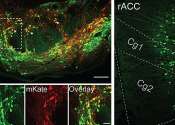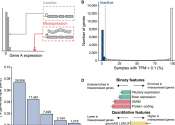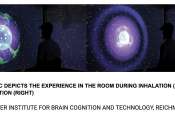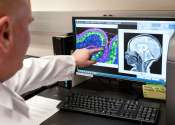Last update:
Medical research
Tuft cells act as regenerative stem cells in the human intestine, study finds
Intestinal tuft cells divide to make new cells when immunological cues trigger them. Additionally, in contrast to progenitor- and stem cells, tuft cells can survive severe injury such as irradiation damage, and contribute ...
27 minutes ago
0
0
Oncology & Cancer
Banning tobacco sales among young people could prevent 1.2 million lung cancer deaths, study suggests
Creating a generation of people who never smoke could prevent 1.2 million deaths from lung cancer globally, according to a study led by researchers from the University of Santiago de Compostela, the International Agency for ...
10 hours ago
0
2
Medical research news
Study reveals molecular mechanism of genetic variant that causes mirror movement disorder
A team of Canadian and American scientists has made a promising breakthrough in understanding the origins of a mysterious neurological disorder known as mirror movements.
13 hours ago
0
28

Synthetic peptide acts as molecular shield to prevent SARS-CoV-2 from infecting cells
A peptide synthesized by researchers at the University of São Paulo (USP) in Brazil protected human lung cells against infection by SARS-CoV-2 in the laboratory and eliminated the inflammation caused by the virus in mice ...
14 hours ago
0
36

Brain molecule that makes neurons less selective could deepen understanding of human cognition
Neuroscientists from Johns Hopkins Medicine say they have determined how a brain cell surface molecule shapes the way certain neurons behave.
14 hours ago
0
48

Study reveals key role of TRIO gene in epileptic encephalopathies
What are the molecular and cellular mechanisms by which some babies develop epileptic encephalopathies and autism spectrum disorder? That's what researchers in Canada and France set out to uncover—and they think they've ...
13 hours ago
0
0

Satisfying friendships could be key for young single adults' happiness, research suggests
A new analysis assesses the heterogeneity of factors linked with happiness among single Americans who are just entering adulthood, highlighting a particularly strong link between happiness and satisfying friendships. Lisa ...
14 hours ago
0
0

Researchers discover mechanism by which estrogen can trigger fast neuronal responses
Estrogen, the major female ovarian hormone, can trigger nerve impulses within milliseconds to regulate a variety of physiological processes. At Baylor College of Medicine, Louisiana State University and collaborating institutions, ...
14 hours ago
0
0

Scientists decode key mutation in many cancers, pointing to expanded role of RNA in human gene expression
Inside every cell, inside every nucleus, your continued existence depends on an incredibly complicated dance. Proteins are constantly wrapping and unwrapping DNA, and even minor missteps can lead to cancer. A new study from ...
17 hours ago
0
75

Viruses found hiding in lungs' immune cells long after initial illness
Doctors have long known that children who become seriously ill with certain respiratory viruses such as respiratory syncytial virus (RSV) are at elevated risk of developing asthma later in life. What they haven't known is ...
15 hours ago
0
28

Curbing blood cancers by teaching immune cells to kill mutant stem cells
Blood stem cells, which give rise to all of our blood cell types, undergo a quality assurance process after they're born. As the lab of Leonard Zon, MD, director of the Stem Cell Research program at Boston Children's, has ...
16 hours ago
0
4

Researchers develop insights into KRAS mutations in pancreatic cancers
A common mutation in the KRAS gene is associated with improved overall survival in pancreatic ductal adenocarcinoma (PDAC) compared with other variants, in part because the mutation appears to lead to less invasiveness and ...
15 hours ago
0
2

Dementia diagnostic markers shown to change with time of day
The time of day when blood is taken can affect the results of tests for diagnosing dementia, according to new research led by the University of Surrey. The study has been published in Translational Psychiatry.
16 hours ago
0
34

Scientists uncover genetic cause of rare autoimmune disorder
A team of international scientists has uncovered the genetic underpinnings of a rare, inherited autoimmune disorder, according to a study recently published in Science Translational Medicine.
15 hours ago
0
3

Reducing sitting by about 40 minutes daily may prevent back pain, research suggests
A new study from the University of Turku in Finland showed that reducing daily sitting prevented back pain from worsening over six months. The result strengthens the current understanding of the link between activity and ...
16 hours ago
0
57

Study hints at ways to generate new neurons in old brains
Most neurons in the human brain last a lifetime, and for good reason. Intricate, long-term information is preserved in the complex structural relationships between their synapses. To lose the neurons would be to lose that ...
17 hours ago
0
54

Artificial left ventricle mimics the shape and function of the human heart
A team of biomechanical engineers at the University of New South Wales, working with a colleague from Queensland University of Technology and cardiac surgeons at St Vincent's Hospital, Sydney, has developed an artificial ...

Intimate partner violence strongly tied to child health issues, research shows
A new study led by Menzies School of Health Research (Menzies) has uncovered a strong connection between intimate partner violence and poor child health outcomes.
17 hours ago
1
36

Researchers map the entire brain of an adult fruit fly for the first time
A Princeton-led team of scientists has built the first neuron-by-neuron and synapse-by-synapse roadmap through the brain of an adult fruit fly (Drosophila melanogaster), marking a major milestone in the study of brains. This ...
17 hours ago
0
26

Eliminating tobacco smoking could help increase life expectancy by 2050, study suggests
Accelerating the decline in tobacco smoking globally, by decreasing smoking prevalence from current levels to 5% everywhere, could increase life expectancy and prevent millions of premature deaths by 2050, according to a ...
10 hours ago
0
2








































